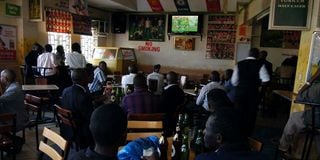Cheers to freedom: Mathira bars reopen after four-month closure sparks outcry

Bar owners in Mathira, Nyeri County, have heaved a sigh of relief after the government bowed to pressure and lifted a four-month moratorium on alcohol business in the area.
This comes barely a fortnight after the Nation highlighted the effects of the mass closure of bars, which had caused an uproar with the business community in the area saying the local economy was on the verge of collapse.
Mathira constituency was the only area in Central Kenya, after Kijabe town in Kiambu County, where the sale and consumption of alcohol was banned after it was declared a "unique zone" by the authorities because it is the backyard of Deputy President Rigathi Gachagua, who has been at the forefront of the fight against alcoholism.
Mr Gachagua is currently embroiled in a power struggle with some Mt Kenya MPs over his call for unity in the region. He has also fallen out with the President after calling on leaders to unite their ethnic groups.
A spot check by Nation.Africa over the weekend revealed that major urban centres, including the regional headquarters of Karatina town, have come back to life, especially in the evenings, unlike during the 'drought season' when the scene was reminiscent of the days of the Covid-19 pandemic.
It is now business as usual, with loud music blaring from the bars, people enjoying nyama choma and drunken revellers staggering in the streets trying to find their way home.
Two weeks ago, some 400 bar owners petitioned the government to allow them to reopen, saying the closure had negatively affected the local economy.
Mathira Bar Owners Association chairman Charles Wachira Ngatia said that apart from their members collectively losing millions of shillings daily, the ripple effect was being felt in other sectors that contribute to the local economy, especially petty traders and the transport industry.
Following mounting pressure, Central Kenya Regional Commissioner Frederick Shisia chaired a meeting attended by senior security officials in the region after bar owners complained that they were being discriminated against as the alcohol business continued as usual in other areas of the region.
An independent check by Nation.Africa found that thousands of street vendors, boda boda operators, eateries, transporters and other small business owners had been hit hard by the closures.
The government had closed the bars ostensibly because of their proximity to educational institutions and churches.
Ms Mercy Wacuka, who was among those affected, said she had regained her livelihood as a street vendor selling sausages and boiled eggs from bar to bar.
"I am happy that they listened to our cry and resolved the matter with the bar owners and came up with a solution so that I can now feed my children," she said.
However, some of the bar owners, who asked not to be named for fear of victimisation, questioned the motivation behind the closure in the first place.
For beer lovers in this part of the country, freedom has arrived and the party has just begun.
"They had curtailed our freedom to take our favourite drink, I know alcohol does not solve problems but neither does milk," said Patrick Kariuki.





